
Uganda Revenue Authority (URA) staff are undergoing specialized training in Oil and Gas legislation and management to strengthen Uganda’s capacity in managing its extractive sector. This initiative, supported by the African Legal Support Facility (ALSF) aims to enhance government efforts to mobilize revenue from Uganda’s oil, gas and mining sectors.
The training, held at Imperial Golf View Entebbe covers complex fiscal regimes and international arbitration related to the extractive industries.
Mohamed Stevens, the Legal Counsel at ALSF emphasized the importance of understanding the obligations of all parties involved before revenues start flowing from the oil sector.
According to Stevens, “It is crucial that Uganda understands the obligations of all parties involved before revenues start flowing from the oil sector. This allows the government to evaluate whether revenues from oil and gas companies are compliant with the nation’s laws.”
Uganda’s recent mining legislation, including the Mining Act, was also discussed as part of the training, especially in relation to artisanal mining activities. Stevens stressed the urgency of being proactive in the management of exhaustible resources, noting that “this is an opportunity to think and act before the oil is extracted.”
The training also aims to ensure that relevant ministries and agencies understand how to manage and invest the wealth generated from these sectors sustainably. As Stevens concluded, “these resources are finite, and we must prepare now for their future depletion. This will help Uganda ensure that revenues are maximized and invested in sustainable projects that benefit future generations.”
This initiative marks a crucial step in Uganda’s efforts to secure a solid foundation for managing its extractive resources effectively, maximizing revenue, and ensuring that the country’s legal framework keeps pace with the growth of the oil and gas sector.
By Joshua Niyonshima






No Comments yet!